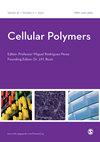灰色发泡聚苯乙烯泡沫的导热性和热处理
IF 1.3
4区 医学
Q4 MATERIALS SCIENCE, BIOMATERIALS
引用次数: 14
摘要
本文主要研究了用戊烷吹制的50 mm厚银灰色(红外吸收)发泡聚苯乙烯(EPS)泡沫板的导热性能。从生产点开始,通过在23°C/50%RH的环境条件下进行短期老化的影响与在70°C的高温条件下进行的老化进行了比较。产品的声明热性能和CE认证符合欧洲EPS产品标准和SG19指南的要求。测量的热导率水平在最终值的1%以内是可接受的,并被认为在产品的整个经济寿命内具有代表性。在70°C的高温下处理5天后,确定50 mm银EPS在标准范围内的水平,而在23°C/50%RH下处理所需时间为23天。后一个时间与在生产后22天进行初步测试并在23°C/50%RH条件下进行调节后,重新测试密度相似且使用年限长达9年的保留灰色EPS板非常一致。高温处理增加了发泡剂的扩散速率,但人们担心EPS珠粒在60°C以上会软化。尽管扫描电子显微镜几乎没有证据表明在高温下细胞膜穿孔显著增加,但有迹象表明,在60°C和70°C下,细胞壁和细胞间骨骼链的褶皱略有增加。在23°C/50%RH条件下进行处理,消除戊烷气体需要更长的时间,但不存在热处理导致材料变化的风险。本文章由计算机程序翻译,如有差异,请以英文原文为准。
Thermal conductivity and conditioning of grey expanded polystyrene foams
This article focuses on the thermal conductivity of 50 mm thick silver grey (infrared absorbing) expanded polystyrene (EPS) foam boards blown with pentane. The effect of short-term ageing from the point of production, by ambient conditioning at 23°C/50% RH, is compared to conditioning at an elevated temperature of 70°C. The declared thermal properties of the product and CE certification are fulfilled by the requirements of the European EPS product standard and SG19 Guidance. Measured thermal conductivity levels within 1% of the final value are acceptable and considered representative throughout the economic life of the product. Levels within the criteria were determined for 50 mm silver EPS after conditioning for 5 days at an elevated temperature of 70°C, whereas for conditioning at 23°C/50% RH the time taken was 23 days. The latter time is in good accord with retesting retained grey EPS boards of similar density and up to 9 years old, after initial testing 22 days from production, and conditioning at 23°C/50% RH. Elevated temperature conditioning increases the rate of diffusion of the blowing agent, but there has been concern about EPS beads softening above 60°C. Although there is little evidence from scanning electron microscopy of significant increase in perforation of the cell membranes at elevated temperatures, there is some indication of a small increase in wrinkling of the walls and intercell skeletal strands at 60°C and 70°C. It takes longer to eliminate the pentane gas by conditioning at 23°C/50% RH but there is no risk of material change from heat conditioning.
求助全文
通过发布文献求助,成功后即可免费获取论文全文。
去求助
来源期刊

Cellular Polymers
工程技术-材料科学:生物材料
CiteScore
3.10
自引率
0.00%
发文量
9
审稿时长
3 months
期刊介绍:
Cellular Polymers is concerned primarily with the science of foamed materials, the technology and state of the art for processing and fabricating, the engineering techniques and principles of the machines used to produce them economically, and their applications in varied and wide ranging uses where they are making an increasingly valuable contribution.
Potential problems for the industry are also covered, including fire performance of materials, CFC-replacement technology, recycling and environmental legislation. Reviews of technical and commercial advances in the manufacturing and application technologies are also included.
Cellular Polymers covers these and other related topics and also pays particular attention to the ways in which the science and technology of cellular polymers is being developed throughout the world.
 求助内容:
求助内容: 应助结果提醒方式:
应助结果提醒方式:


